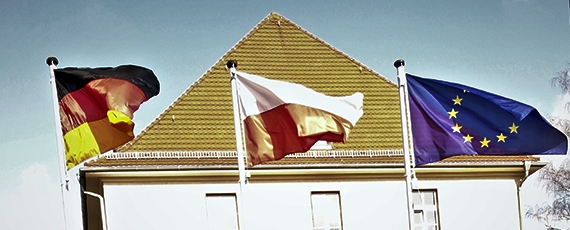(24.03.17) The University of Applied Police Sciences of the Brandenburg State has been in a close relationship with the Police Academy of Szczytno within the framework of the Erasmus+ programme for some time. Ireneuz Bembas and Krzysztof Jóźwicki, two lecturers from Szczytno, paid a visit to the police university of the Brandenburg state between 13 March and 17 March because of the Erasmus+ possibilities.
Both Polish scholars are experts for criminal law. They showed a great interest for the study curriculum of the higher level of command at the University of Applied Police Sciences of the Brandenburg state; this means for the differences between Polish and German criminal law and for the structure of our police forces in Germany and Brandenburg in general. Police officers for the upper and higher level of command graduate from the Police Academy Szczytno.
The Vice President of the University of Applied Police Sciences of the Brandenburg State, Dr Christe-Zeyse, and the Head of the International Centre gave a warm welcome to the visitors and introduced them to main aspects of the policing work and the studies at the university here. This included information on the international activities of the University of Applied Police Sciences in Oranienburg. Their visit continued with a campus tour and a very emotional visit of the monument of the Sachsenhausen concentration camp, adjacent to our university, in the afternoon of the first day.
On the following day, a Tuesday, our guests visited a training unit called “Police intervention exercises”. This was followed by a presentation of the Dean for the upper level studies, Kerstin Petersen-Schäfer, on the nature of the bachelor-study at our university. This lead to an intense exchange of academic views on the structure and the necessary content of police education between our Polish visitors and the dean and the lecturer for criminal law Andreas Gritsch of our University of Applied Police Sciences. Both sides discussed the differences between German and Polish criminal law and talked about the similarities in policing. The visiting lecturers were also highly interested to hear about our campaign to attract students from Poland to our police studies in Oranienburg. Later that day, the visitors were introduced to our indoor shooting range and the blue box as a training facility for shooting and non-shooting situations. The day ended with a lecture on criminal law by Andreas Gritsch which was visited by our Polish guests.
The recording of traffic accidents of a criminal cause on our traffic policing exercise field was the first event for the Polish visitors to take part on Wednesday. The differences between German and Polish law were again being debated during the exercises. Later that day, they visited the Police Operations Centre in Potsdam. The sightseeing of the park of the Sanssouci Palace and the Dutch Quarter became a cultural highlight of the Potsdam day.
A visit of the Common Centre of German Polish Police and Customs Cooperation in Swiecko was on the schedule for Thursday. On the way back to Oranienburg to the Unviersity of Applied Police Sciences of the Brandenburg State, we showed them Berlin, so that our guests were able to see at least some of the exciting sights of Berlin.
The visit of the lecturers from Poland was concluded on Friday by another coming together with the Head of the International Centre. Further aspects of the development of international police relationships were brought up then by both sides during the conversation and were discussed comprehensively. The feedback we received from our visitors about their experience at our university was very positive. They very much appreciated the exchange of views and opinions on the structure and contents of the studies in Oranienburg and on a close cooperation between the Brandenburg state and neighbouring Poland. Ireneuz Bembas and Krzysztof Jóźwicki were also impressed by the modern standard of our Police Operation Centre in Potsdam.
We would like to thank all people who helped to make this visit a success!







